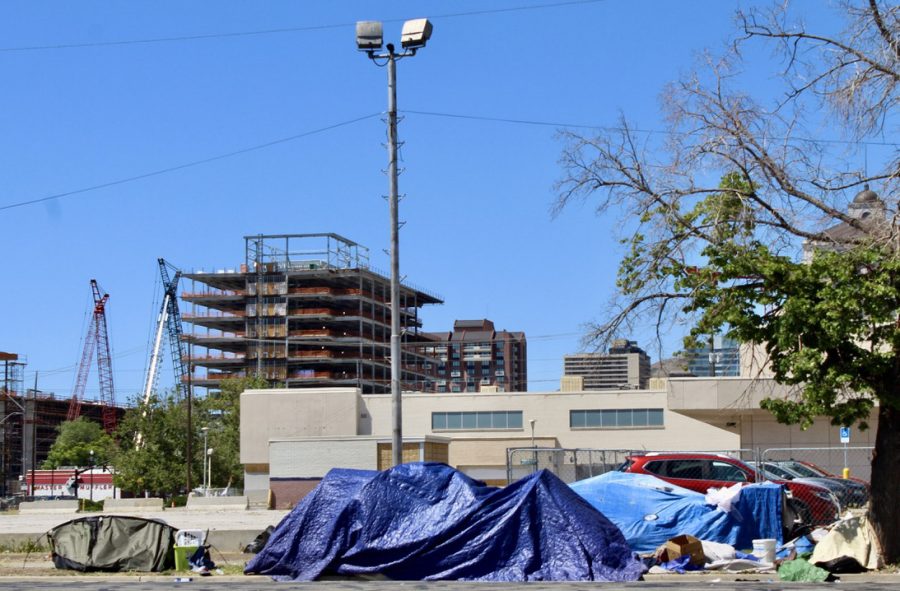Torres: Free Fare February Highlights Our Mistreatment of Homeless People
A tent city built by the homeless in Salt Lake City on Sunday, May 30, 2021. (Photo by Brooklyn Critchley | The Daily Utah Chronicle)
April 5, 2022
The Utah Transit Authority recently held Free Fare February. UTA saw a 59.03% increase in ridership over Free Fare February from last year. But aside from improving air quality, the free ridership campaign showed us how public transportation access impacts Utah’s unhoused populations.
In 2021, the Salt Lake valley saw 10,569 people facing homelessness. UCLA conducted a study that included UTA, finding that there was a 49.6% increase in homelessness on public transportation during the pandemic. It also found that transit agencies in the United States report a 62.3% increase in shelterless passengers when they provide free fares.
Unfortunately, 86% of U.S. transit agencies report that they received complaints about homeless riders, demonstrating that people clearly aren’t shy to express prejudice against unhoused people. Free Fare February and its increased ridership uncovered the homelessness crisis in Salt Lake City and the negative attitude towards its victims. We must change our mindset towards our unsheltered neighbors.
The U’s students who use UTA services to get to school have witnessed the vital resources that public transport provides to unhoused populations. With a 30% increase in evictions this winter in Salt Lake City, air-conditioned trains and buses provide some shelter in our city’s chilly winter months.
However, Salt Lake City fails to properly manage its housing crisis. In 2019, the Salt Lake City Road Home shut down, and yet, Salt Lake City officials found it “startling” that the other shelters strained to provide aid afterward. In August 2021, Salt Lake City sponsored emergency shelter beds for the winter and still found that they regularly reached 90% capacity and permanent shelters were at 97% capacity.
Some grassroots organizations have started to take matters into their own hands. Open Air Shelter Coalition is a group that’s composed of previous and current unsheltered people as well as local mutual aid groups and resource centers. They provide direct aid to unhoused populations with resources that road homes and shelters are unable to deliver. They are currently battling to get bureaucratic support while also protesting the city’s encampment sweeps. Like them, other organizations want to make a change in our state and nationwide.
Utah isn’t alone in its disregard for homeless populations. The New York Daily News reported an increase in unsheltered passengers using their public transportation services as shelter during the pandemic. Unfortunately, discrimination against unhoused populations can be seen through violence, such as the video that surfaced of an NYC cop punching a homeless passenger for taking up more than one seat in July 2020.
I have personally observed discrimination against shelterless people on public transportation. During Free Fare February, I saw a slightly disheveled old man wearing a backpack and a woman wearing a University of Utah polo with her feet up on the seat. He asked her to remove her shoes from the seat, which erupted into an argument. In a moment of silence, the woman scoffed and said, “I can’t wait until February is over.”
This event highlights our privilege as university students and employees to act as though we can restrict the unhoused from using a public service like the TRAX. We must have compassion toward unhoused people and their situations. Adults with substance abuse, adults with mental illness and survivors of domestic violence made up the largest homeless subpopulations in 2021 for Utah.
Unsheltered people belong in this city just as much as we do and we have neglected to provide them with the resources and the compassion they need. By realizing they are victims of their circumstances, we can change our mindset and support existing aid programs working towards solving this crisis. Free Fare February reminded us of what it’s like to provide for shelterless people. Instead of seeing this as hopeful, many witnessed the suffering they experienced and spouted hostility. Unhoused people are our neighbors, and we must do better to help them.
If you or someone you know is unsheltered and in need of assistance, please call the Shelter the Homeless hotline at (801) 990-9999.








